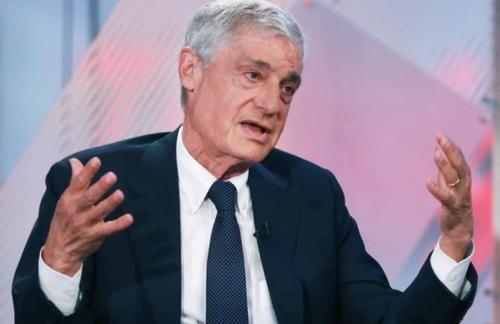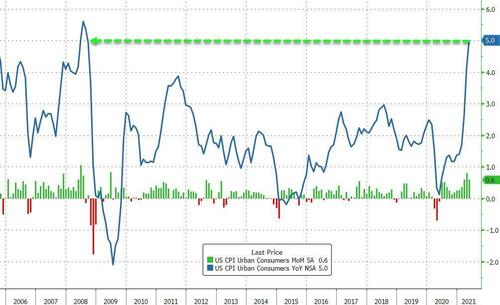Rubin Joins Fellow Clintonite Summers With Warning About "Elevated Risk" Of Persistent Inflation
Earlier this year, former Clinton Treasury Secretary and erstwhile Harvard President Larry Summers was pilloried by his fellow Democrats for daring to suggest that the firehose of COVID-inspired fiscal and monetary stimulus would likely cause runaway inflation. Then, over the weekend, Summers doubled down on that (so far, correct) call, warning that inflationary pressures might be more persistent than the Fed's Chairman Jerome Powell (who continues to insist that price pressures will ultimately be "transitory" despite the FOMC's decision to move up its expectations for the timing of rate hikes to account for hotter-then-expected inflationary prints) has let on.
Now, it looks like another Clinton-era economic nabob, Summer's predecessor as Treasury Secretary Robert Rubin (who, let's not forget, was once a member of Clinton's "committee to save the world" alongside Summers and former Fed chief Alan Greenspan) is speaking up to warn about the "material risk" that the US could see persistently elevated inflation for the foreseeable future.
Rubin also praised his successor, saying Summers had performed "a great public service" by warning that the recent spikein prices might fail to dissipate amid the trillions of dollars of spending and relief ordered up by President Biden and the Democrat-controlled Congress.
Speaking Monday during the virtual Aspen Ideas Festival, Rubin said "we have a strong economy." And while inflation may ultimately prove to be transitiory, "there's a material risk of it being enduring."
"As an investor and as a policy maker, I would have a cautious bias," Rubin said.
Summers said over the weekend that he sees prices rising "pretty close" to 5% at the close of the year. To be sure, that doesn't seem like much of a stretch considering that May's headline CPI number showed prices have jumped 5% over the prior 12 months.
Rubin's comment pits him and Summers squarely against their successor, Treasury Secretary Janet Yellen, who has been one of the most visible advocates of the "transitory" inflation argument, and one of the loudest cheerleaders' for the Democrats' COVID-era spending ("now is the time to go big" - remember?) Yellen recently told lawmakers that she expects inflationary pressures to recede below May's level by the end of the year. The Fed's inflation projections also see price pressures easing.
But Rubin and Summers aren't the only ones sounding the alarm about inflation (though they might be the only Democrats). BofA Chief Investment Strategist Michael Hartnett recently wrote that, far from being transitory, hyper-inflationary pressures might persist for as long as four years.
Observing that US inflation averaged 3% in the past 100 years, 2% in 2010s, 1% in 2020, and is "annualizing 8% thus far in 2021", Hartnett writes that it is "so fascinating so many deem inflation as transitory when stimulus, economic growth, asset/commodity/housing inflations (are) deemed permanent." Assessing the risks from a global perspective, a team of senior Deutsche Bank strategists recently warned that developed economies like the US and Europe are "sitting on a time bomb".
If this keeps up, the Dems will need to dispatch Stephanie Kelton to get their errant economists back in line.
https://ift.tt/360omlQ
from ZeroHedge News https://ift.tt/360omlQ
via IFTTT



0 comments
Post a Comment